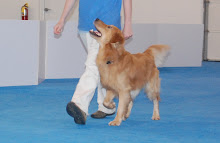I am better at helping students reach their goals. Probably because it's a lot easier to be asking someone else to do all the work to get from Point A to Point B than it is to do that work yourself. It's why I prefer teaching to training my own dogs!
That said... some of my recent reading has prompted me to re-think client goals. Should pet and sport/enthusiast classes be different? Shouldn't I hold everyone to a high standard? If I set high expectations, will everyone work to achieve those levels of success? Or should the content be different because of the different goals?
 |
| Blaze's goal is to never leave the water. Griffin is considering the options. |
I don't want to be the stereotypical dog training instructor and say, "They never practice, it's their fault!" It's my responsibility to help them reach their goals and maybe my instruction wasn't clear or it was too difficult or I gave too many steps. With a lot of these recent cases, the first thing I hear is "We didn't get to work at all this week. The XYZbehavior is horrible, it HAS to change!" No training happened. More importantly, no management was put in place. The dog practiced the inappropriate behavior dozens of times during the week. Somewhere I am failing those families and something has to change.
I'm going to start adding in to my questions, "How much time are you wanting to put into training?" and we'll use that measurement to help with the activities. It's part of the reason I don't use the bells that some dogs ring to go outside.... most of my student's don't want to spend the time period teaching the dogs. I don't blame them...I've never done it. Last night we talked about a puppy getting into the trash. They've used some management, but not always. The puppy is getting more sneaky. We talked about all the training we could do...."But in reality, it would just be easier to get a locking trash can. Spend the $25-30, and then you have hours and hours to spend with your puppy training other things. You don't have to worry about your dog making a judgement mistake and grabbing something that could kill him." If someone doesn't want to put in the time, we can find variations and management options. For whatever reason, life-long management sometimes gets a bad name in dog training, as if it's not really resolving the issue. Sometimes other things are just more important ways to spend time.
On the other end of it, I've had a small number of very dedicated clients, with fairly normal dogs, wanting to do lots of sports and activities, wanting a high level of proficiency, and putting in a lot of practice. Yet they are getting very little progress. I can see the weak training skill areas. I try to design lessons to improve the human's ability for training and to address the dog's weak areas. And it still doesn't go well. I'm letting down those students as well, but in a very different way.
All that said, I'm not unhappy and am excited to see if the upcoming changes in classes will get even better results.
--------------------
In other news.... I'm already behind on processing and rewriting my seminar notes. Griffin was pretty great at class, super fast and not running away. We messed up every single exercise.... but the speed and enthusiasm were our priorities. It should go better next week.




No comments:
Post a Comment